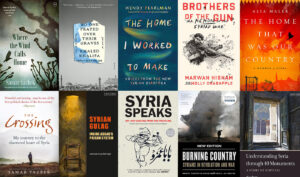Silence is a Sense, a novel by Layla AlAmmar
Algonquin March 2021
ISBN 9781643750262
Farah Abdessamad
“The thing is, when you can’t speak, people assume you can’t hear either,” says the anonymous 26-year-old Syrian refugee in Layla AlAmmar’s second novel, Silence is a Sense. The book tells the story of “The Voiceless,” a mute young woman from war-torn Aleppo, who has left family and life behind to reside in an unspecified British town only to find that the solace she sought lies beyond her reach.
The Voiceless is studying for an online degree in political science, but what she does all day and night is to linger in the liminal, dangerous space between living and dying, the present and the past, negotiating with the refractions of her relentless trauma which hampers her ability (or willingness) to speak. She hints at and describes the multiple physical and emotional hardships she has overcome. She either stays in the sanctuary of her apartment or when she ventures outside, it is always within a determined perimeter. The Voiceless writes a newspaper column using her pseudonym and spies on her neighbors from her window. How will she cope when irruptions threaten to shatter her sanitized and precarious cocoon?
From her apartment in “West Tower, fourth floor, flat three,” her world is small. Neighbors appear and animate behind their respective windows like marionettes. There’s “The Juicer” with a six-pack torso and strict macro diet; the messy family of Helen, surviving domestic violence, and her daughter Chloe; the old couple Tom and Ruth speaking in an indecipherable language; Adam who will grow to become a friend and confidant, and others. The Voiceless follows their slices of life, their habits, from a distance until the would-be hermetic cordon sanitaire between her and them is no longer tenable.

Silence is a Sense conveys the fragments of war, particularly the war in Syria that pulls the Voiceless to shoulder her past like the unfortunate Sisyphus and his rock. Writing and reading are a form of escapism for this literature-savvy young woman who attended university in Damascus before the war broke out and reveres Edgar Allan Poe. Though she had claimed “the right to live with dignity, the right to think without fear, the right to exist outside of a state of emergency” in the frenzy of a buoyant Syrian Spring, she realizes years later that safety doesn’t and can’t exist, since fear and insecurity haven’t abandoned her. Racist slurs and attacks in her new home in the UK shake her to the core and break her frail bubble. Tranquillity may be a fantasy.
Her recollections of the war are present in associations and flashbacks when, for instance, a neighbor she encounters physically reminds her of a family member. Her repeated nightmares are gripping. Malak al Mawt, the Angel of Death as recounted in Islam, makes frequent appearances in the book. It’s haunting company.
The psychiatrist and psychoanalyst Carl Jung wrote that sensation is a physical stimulus to perception. Silence contrasts with the noise of war the Voiceless was subjected to. Trauma expresses itself in silence as if muting herself would also shut down the vagaries of her mind. The sound of war is a music, of bombs, of crying infants and wails. It is a cacophony, often punctuated by long periods of boredom in between two horrors — in my experience this is true.
I’ve had my own close encounters with Malak al Mawt and deeply connected with the connection between speech and self-realization in the novel. One day not too long ago, I decided I wanted to do something about the nightmares and the fear. I was exhausted. I had lost sleep, and had grown unbearably irritable. I took a short time-out from my work after ten years on-and-off in the Middle East, a region I’ve known in both war and peace. I stepped on a plane, watching desolation become tiny confetti dots below, and after an overnight flight, dipped my toes the warm waters of a Thai beach. I was fully conscious of the privilege this constituted — conflict still raged in the country from which I had just departed. I attended a vipassana retreat with a group of strangers, which involved following a mindfulness program for a week under Buddhist monastic rules, without speaking, exchanging eye contact or touching.
The silent retreat flew by (some people dropped out) and when it was time to “break” our temporary vows, including speaking, I observed people rushing to talk to each other, laughing, removing their smart phones out of their bags, and scrolling through the social media posts they had missed. I stayed numb for a long while, at a table drinking a glass of water by myself (I never drank water more slowly than that day), unwilling to engage with the world again just yet, finding pleasure in hushing sounds, limiting echoes, protecting an invisible nest and crowding-out the brouhaha of sound bombs which still reverberated in my ears. Kuwaiti-American author Layla AlAmmar masterfully depicts that silence is a refuge, too, for people affected by the unspeakable — a justifiable parenthesis. What was there to say to the Other? There were only pauses to convey. I found truths in Silence in a Sense where for me the line of fiction and reality often blurred.
When you come from a place where the walls have ears and you spend your life hiding and fabricating, trying to learn the rules to games you have no hope of ever winning and searching for cracks from which to scurry out, your instinct is to hold certain matters close to the chest. It’s about self-preservation, that most basic of human instincts.— Layla AlAmmar
The novel conveys the dissonance one feels reconciling a “here and now” when so much pulls away and apart. Wherever she is, the Voiceless doesn’t belong — in Syria where she didn’t abide by old traditions, nor in this British setting where she’s confronted with the violence of normalcy (and the normalcy of violence).
Her surreal exchanges with Josie, her column editor, are most striking. Josie prompts the Voiceless to cull more stories from her life back home; she wants more about what it means to be a refugee and less politically-charged reflection from this newcomer. Josie’s western gaze is after traumaporn. The story in the novel takes place in the backdrop of the Manchester bombing, and when a London knife attack occurs, Josie tells the Voiceless that it’s a big deal as real people (eight) died and not to throw around casual statements which may obfuscate people’s shock and grief. But whose grief is Josie interested in? Unsurprisingly the Voiceless struggles with the obscenity of this preaching and questions the right of her editor to label real lives, in opposition to the implied “fake lives” that may extend to her kin beyond the Mediterranean. Is there a number above which death becomes meaningless and unimportant, she wonders. This reminded me of the quote often attributed to Joseph Stalin, “the death of one person is a tragedy; the death of one million is a statistic,” which also cynically applies to our COVID-19 era. How to explain that between 400,000 to 500,000 of her people have died, and that she’s one of over five million Syrian refugees, not counting the six million who have been internally displaced within Syria’s borders? The Voiceless obviously knows more about suffering and loss — viscerally, not in abstract terms — but she can’t communicate it in a way that reaches people like Josie. And perhaps, others aren’t ready to truly listen (and the Syrian plight continues). Speaking forces accountability.

Trauma, as Layla AlAmmar demonstrates, is dealing with solitude even when you are in a group of people. Despite the immense sadness this may cause, her protagonist refuses to fall to expected abysmal depths. The Voiceless retains her dignity despite the hardships she’s endured. AlAmmar succeeds in challenging the refugee or asylum-seeker stereotype, including the one of a young Arab woman. The Voiceless doesn’t flee poverty and isn’t there to “steal” British jobs. She’s educated and impresses with her near-native English writing style to the extent that some of her column readers believe her refugee story is a cover and a fraud. She holds agency and doesn’t rely on a man for protection. She stuck with difficult decisions and isn’t sorry for herself. Though she hints at abuse during her journey from Syria to the UK, her sexuality is not a source of shame — she pursues her desires when she wants to.
Silence is a Sense is a modern-day tragedy borrowing classical elements of the genre. From tragic dimensions identified over 2,300 years ago, we find the recollections of her change of fate and the long, Odyssean migrant route which took the Voiceless across Europe; the tragedy of her own suffering; of her character, not intervening at a crucial moment because she couldn’t bring herself to speak and when she does it’s too late (which includes a scene of self-awareness when she unveils the extent of her circumstances); also of spectacle and décor.
I was most interested in the mirror-like, almost claustrophobic arrangement of the building, where most of the action takes place, and her interactions with the other residents. The Voiceless obsessively peeks at her neighbors’ lives, drifting into theirs, and she realizes that they may also “see” something in return. What is it that they guess behind her mute shadow? What feeling or identity does she project, and how does she modulate her presence to her spectators?
These questions explore the dramaturgical lens offered in Erving Goffman’s The Presentation of Self in Everyday Life originally published in 1956. This sociological work framed human and social interactions in theatrical terms, positing them as nothing short of a performance. We tend to avoid embarrassing situations, and adjust our appearance or manners as actors may arrange costumes, gestures and intonations to convey specific meaning and influence over encounters. The Voiceless, as we also are, is often caught in the shifting glare of what constitutes an inside and an outside. In her case, turning inwards opens the matryoshka dolls of her memories — leading to a past outside, in faraway Syria — and the present-day outside is often the prisoner of her inner conflicts. The Voiceless is trapped unless something radical changes, a theme AlAmmar had already developed in her UK debut novel, The Pact We Made.
Silence is a Sense is a polyphonic, psychological, character-driven novel about the banality of violence and the possibility of charting a healing process (trigger warning for rape, suicide attempt and depression). Beyond statistics, it explores how to understand the human-scale motions of the mind and surveys invisible scars. “The human need for stories is itself an obstacle to memory,” AlAmmar writes, though one may disagree. Stories are also what nourish memories. Silence is more than nothingness, it is a language, an act. Sisyphus’ boulder inexorably rolls back downhill. Yet he persists in his task and confronts absurdity with humanity.





































































